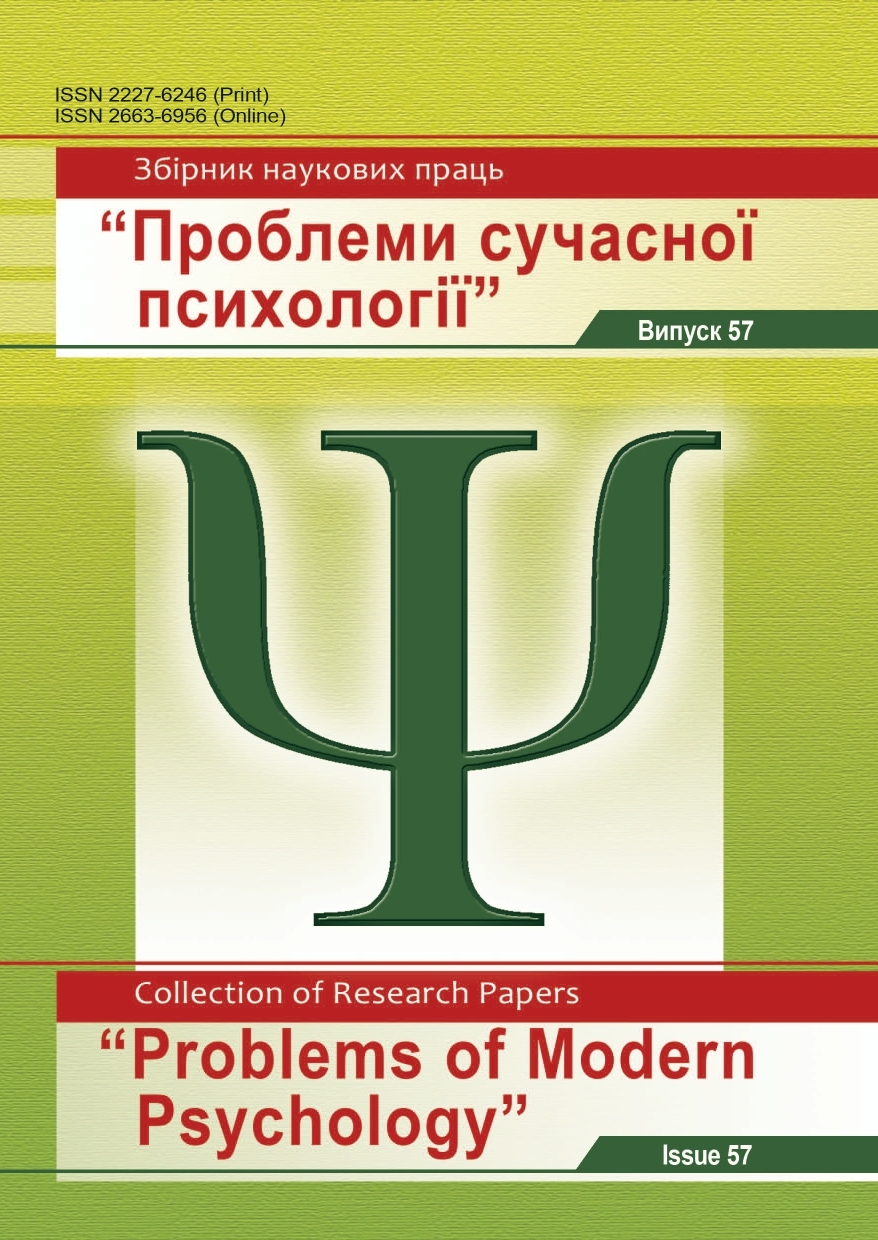Psychological Components of Pedagogical Communication
DOI:
https://doi.org/10.32626/2227-6246.2022-57.70-89Keywords:
pedagogical communication, psychological components, a discussion, a casual dialogic relationships, the system of accepted personal meanings, stylistic interruptionsAbstract
The purpose of our research is to determine psychological components of pedagogical communication; to show the most successful ways of organizing discussion at the lessons at institutions of higher education.
Methods of the research. The following theoretical methods of the research were used to solve the tasks formulated in the article: the categorical method, structural and functional methods, the methods of the analysis, systematization, modeling, generalization. The method of organizing empirical research was used as an experimental method.
The results of the research. It is proved, that for different people the same word, the action, the circumstance might have different meanings. Therefore, the child must not only master the language (words with different meanings), but also the system of accepted personal meanings, focused on relevant moral and spiritual values. It is showed, that, on the other hand, adults needed to understand the personal meanings of the child. Otherwise, interpersonal conflicts can arise in the process of communication, which not only lead to misunderstanding between partners, but also to disruption of feedback and interaction between people in general.
Conclusions. The teacher is proved to have formed his/her own individual language style, which would correspond to the composition of his/her personality, promote the person’s adequate expression and compensate the teacher’s negative traits. It is showed, that there was a great reason to believe that in order to achieve the greatest expressiveness of speech, to create a casual dialogic relationships in the discussion, the teacher could use elements of colloquial speech, heterogeneous vocabulary, stylistic interruptions, etc. In addition, mastering the techniques of creating the individual style of pedagogical speech forms, a teacher’s social maturity, it contributes to a more adequate orientation in various situations that are arisen in the classroom during discussions.
References
Aleksandrov, A.A., Memetova, K.S., & Stankevich, L.N. (2020). Referent’s Lexical Frequency Predicts Mismatch Negativity Responses to New Words Following Semantic Training. Journal of Psycholinguistic Research, 49, 187–198. Retrieved from https://doi.org/10.1007/s10936-019-09678-3.
Blagovechtchenski, E., Gnedykh, D., Kurmakaeva, D., Mkrtychian, N., Kostromina, S., & Shtyrov, Y. (2019). Transcranial direct current stimulation (tDCS) of Wernicke’s and Broca’s areas in studies of language learning and word acquisition. Journal of Visualized Experiments, 37–59. https://doi.org/10.3791/59159.
Charles, W. (2000). Contextual correlates of meaning. Applied Psycholinguistics, 21(4), 505–524. Retrieved from https://doi.org/10.1017/S0142716400004057.
Honcharuk, Nataliia, & Onufriieva, Liana (2018). Psykholohichnyi analiz rivniv pobudovy komunikatyvnykh dii [Psychological analysis of the levels of construction of communicative actions]. Psycholinguistics. Psykholinhvistyka. Psikholingvistika – Psycholinguistics. Psycholinguistics. Psycholinguistics, 24(1), 97–117. Retrieved from https://doi.org/10.31470/2309-1797-2018-24-1-97-117 [in Ukrainian].
Ivashkevych, Er., & Komarnitska, L. (2020). Psychological aspects of comics as the paraliterary genres. Zbirnyk naukovykh prats «Problemy suchasnoi psykholohii» – Collection of research papers “Problems of modern psychology”, 49, 106–130. Retrieved from https://doi.org/10.32626/2227-6246.2020-49.106-130.
Maksymenko, S., Тkach, B., Lytvynchuk, L., & Onufriieva, L. (2019). Neiropsykholinhvistychne doslidzhennia politychnykh hasel iz zovnishnoi reklamy [A neuropsycholinguistic research of political slogans from outdoor advertising]. Psycholinguistics. Psykholinhvistyka. Psikholingvistika –Psycholinguistics. Psycholinguistics. Psycholinguistics, 26 (1), 246–264 [in Ukrainian].
Mykhalchuk, N., & Bihunova, S. (2019). The verbalization of the concept of “fear” in English and Ukrainian phraseological units. Cognitive Studies | Études cognitives, Warsaw (Poland), 11. Retrieved from https://doi.org/10.11649/cs.2043.
Mykhalchuk, N., & Ivashkevych, Er. (2019). Psycholinguistic Characteristics of Secondary Predication in Determining the Construction of a Peculiar Picture of the World of a Reader. Psycholinguistics. Psykholinhvistyka. Psikholingvistika – Psycholinguistics. Psycholinguistics. Psycholinguistics, 25(1), 215–231. Retrieved from https://doi.org/10.31470/2309-1797-2019-25-1-215-231.
Mykhalchuk, Nataliia, & Khupavsheva, Natalia (2020). Facilitation of the Understanding of Novels by Senior Pupils as a Problem of Psycholinguistics. Psycholinguistics. Psykholinhvistyka. Psiholingvistika – Psycholinguistics. Psycholinguistics. Psycholinguistics, 28(1), 214–238. Retrieved from https://doi.org/10.31470/2309-1797-2020-28-1-214-238
Downloads
Published
How to Cite
Issue
Section
License
Copyright (c) 2022 Mykhalchuk Nataliia, Rudzevych Іryna

This work is licensed under a Creative Commons Attribution-NonCommercial 4.0 International License.
Copyright
The Editorial Board has the full right to publish original scientific papers containing results of theoretical and experimental research works which are not currently subject to review for publication in other scientific editions. The Author shall transfer to the editorial board of the Collection the right to spread the electronic version of the paper, as well as the electronic version of the paper translated into English (for papers originally submitted in Ukrainian and Russian) by all kinds of electronic means (placement at the official website of the Collection, electronic databases, repositories etc).
The Author of an article reserves the right to use materials of the paper, without approval with the editorial board and the founders of this Collection: a) partially or fully, for educational purposes; b) for writing own dissertation papers; c) for preparation of abstracts, conference reports and presentations.
The Author of an article can place electronic copies of the paper (including the final electronic version downloaded from the official website of the Collection) at:
- personal web resources of all Authors (websites, webpages, blogs etc.);
- web resources of the institutions where the Authors are employed (including electronic institutional repositories);
- non-profit public access web resources (for example, arXiv.org).
But in all cases, it is obligatory to have a bibliographic reference to the paper, or a hyperlink to its electronic copy placed at the official website of this Collection.






